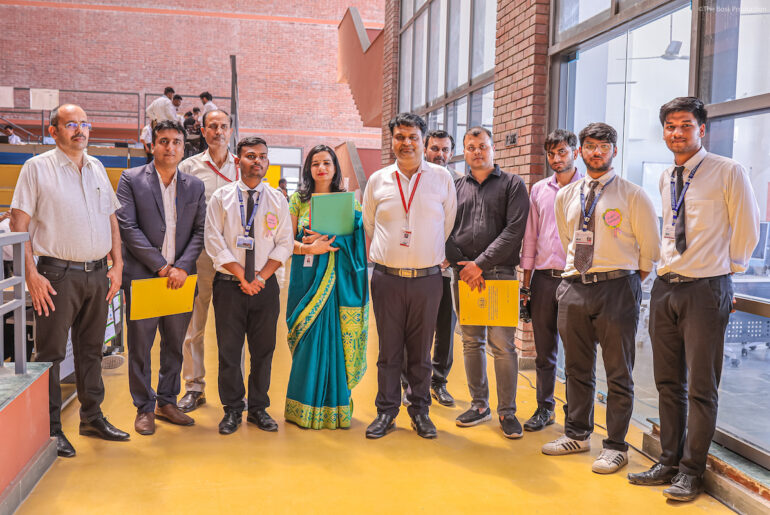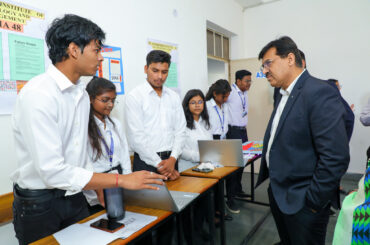CSE Syllabus Semester Wise
The Computer Science Engineering Syllabus Semester Wise provides a structured outline of courses and topics that students will encounter throughout their Bachelor of Technology in Computer Science Engineering program.
This detailed syllabus is divided into eight semesters, with each semester building on the knowledge and skills acquired in the previous one. In the initial semesters, students focus on foundational subjects such as mathematics, physics, and introductory computer science concepts.
As they progress, the syllabus incorporates more advanced topics like algorithms, data structures, computer networks, operating systems, and database management. Additionally, specialized electives in areas like artificial intelligence, cybersecurity, and data science are offered in the later semesters, allowing students to tailor their education to their career interests and industry demands.
This comprehensive semester-wise syllabus ensures that graduates are well-equipped with both theoretical knowledge and practical skills necessary for a successful career in computer science engineering.
Some of the most opted courses in India and St. Andrews college or different Engineering college or Management colleges are as follows:-
- Btech
- Btech CSE
- MTech
- Btech ETCE
- BCA
- BBA
- MBA
- MCA
- DPharma – St. Andrews College of Pharmacy
- BPharma – St. Andrews College of Pharmacy
- BArch – St. Andrews College of Architecture
Overview of Computer Science Engineering
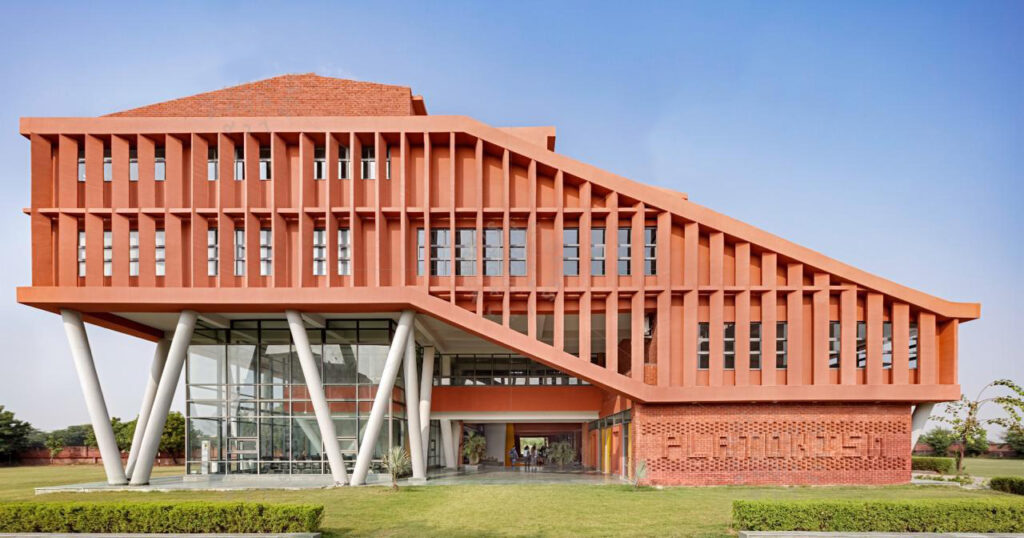
Computer Science Engineering (CSE) and Computer Engineering are disciplines that encompass the study of computation, computer algorithms, programming languages, software development and software evolution, computer hardware, engineering drawing, data communication and the theoretical foundations of computing.
The Computer Science Engineering Syllabus Semester Wise covers the overall structure and content of the program, ensuring a comprehensive understanding of these areas. This diverse and rapidly evolving field underpins many aspects of modern technology and society.
Here’s an overview of the key aspects of Computer Science Engineering:
Fundamentals of Computing
Algorithms and Data Structures
In computer engineering subjects, algorithms are systematic procedures or formulas crafted to solve specific problems, while DS facilitate efficient organization and storage of data, geometric data structures , ensuring optimal capabilities for access and modification.
Theory of Computation
In computer engineering subjects, students delve into formal languages, automata theory, computability, and complexity theory, essential for comprehending the capabilities and limitations of computers in efficient problem-solving. Computational theory plays a crucial role in exploring these aspects of efficiency and constraints in computing.
Programming and Software Development
Programming Languages
Sequential programming languages like C, C++, Java, Python, and others are utilized extensively for developing software and applications.
Software Engineering
Principles and methodologies for designing, developing, testing, and maintaining appliaction systems are integral to the software development lifecycle.
Computer Architecture and Organization
In the realm of computer science fundamentals, understanding the design of computing systems entails grasping CPU architecture, memory systems, I/O systems, and their interplay to execute programs with efficiency.
Operating Systems
In both core and optional subjects, students explore operating system, which are crucial software managing computer hardware and providing essential services such as resource allocation, scheduling, file systems, and security measures.
Database Systems
Storage, retrieval, and Database management of data, including relational databases (SQL) and NoSQL databases (MongoDB, Cassandra).
Networking and Communication
The exploration of network programming concepts involves studying communication protocols, network architectures, and transmission media. These elements facilitate computers in communicating effectively and sharing resources across networks.
AI and ML
The development of algorithms and systems that allow computers to perform tasks that typically require human intelligence, such as pattern recognition, language understanding, and decision-making.
Computational Graphics and Visualization
Techniques for creating, manipulating, and displaying visual images and data, used in applications like games, virtual reality, scientific visualization, and data analytics.
Security and Cryptograph
Techniques for protecting computing systems and data from unauthorized access, attacks, and vulnerabilities, including encryption and secure communication protocols.
Web Technologies
Development of web-based applications, including client-side and server-side programming, web services, and frameworks (HTML, CSS, JavaScript, PHP, Node.js).
Embedded Systems
The engineering of application systems involves designing and developing computer systems embedded in devices and machines, including automotive systems, medical devices, and IoT devices.
Ethics and Professionalism
In the realm of engineering sciences, the study includes ethical considerations surrounding computer use and the responsibilities held by computer professionals within society.
Computer Engineering

Computer Science Engineering (CSE) is a dynamic and rapidly evolving field that integrates principles of computer science with engineering methodologies to design, develop, and implement software and hardware solutions. It encompasses a broad spectrum of topics including algorithms, data structures, computer architecture, O.S, database systems, and software engineering principles.
Professionals in Computer Science Engineering and Computer Engineering are pivotal in driving technological progress across industries. They innovate by developing cutting-edge applications, enhancing cybersecurity measures, and optimizing computing capabilities. The Computer Science Engineering Syllabus Semester Wise emphasizes problem-solving, innovation, and lifelong learning, paving the way for expansive career paths in software development, IT consulting, research, and academia.
Computer Science Engineering Syllabus

The CSE syllabus and computer engineering syllabus cover a wide range of subjects, including core subjects, elective subjects, practical topics, and projects.
The Computer Science Engineering Syllabus Semester Wise is structured to offer a thorough grasp of both theoretical principles and practical applications in computer science and engineering. Students have the flexibility to select specialized areas and elective subjects aligned with their career aspirations and personal interests.
The Engineering syllabus also includes industry-specific areas of IT, design and computational processes, and teaching methodology.
Core Subjects
The core subjects of Computer Science Engineering and core computer engineering subjects include:
Data Structures
Algorithms
Computer Architecture
Operating Systems
Database Management Systems
Computer Software
Programming Languages
Here’s an in-depth exploration of some of the fundamental computer engineering subjects commonly included in CSE syllabi:
Programming Languages and Paradigms
Objective
To understand various programming paradigms, language syntax, semantics, and their application in software development.
Topics
Introduction to coding languages (C, C++, Java, Python), functional programming, object-oriented programming, procedural programming, scripting languages, and their comparison which are covered in CSE engineering stream.
Data Structures and Algorithms
Objective
To learn how to organize and manipulate data efficiently using different data structure and algorithm design, and to analyze algorithms for performance. These are fundamental computer engineering subjects.
Topics
Arrays, linked lists, stacks, queues, trees, graphs, hash tables, sorting algorithms (e.g., quicksort, mergesort), searching algorithms (e.g., binary search), algorithm design techniques (e.g., divide and conquer, dynamic programming), complexity analysis (time and space complexity).
Operating Systems
Objective
To understand the fundamental concepts of O.S and their role in managing computer hardware and software resources.
Topics
Process management, memory management, file systems, I/O systems, concurrency and synchronization, virtualization, security and protection mechanisms, case studies of popular operating systems (e.g., Unix/Linux, Windows).
Computer Architecture and Organization
Objective
To study the structure and functioning of computer systems at various levels of abstraction, from digital logic circuits to high-level programming languages.
Topics
Digital logic design, CPU architecture (pipelining, instruction
Database Management Systems (DBMS)
Objective
To learn the concepts and techniques used in database design and managing databases, including relational and non-relational databases.
Topics
Relational database concepts (tables, schemas, SQL queries), ER modeling, normalization, transaction management, concurrency control, distributed databases, NoSQL databases (e.g., MongoDB, Cassandra).
Software Engineering
Objective
In CSE engineering subjects, the focus is on comprehending principles, system software development methodologies, and best practices essential for designing and overseeing large-scale software systems.
Topics
In computer engineering subjects, students delve into the software development life cycle (SDLC), requirements engineering, software design encompassing modular design and patterns, software testing and quality assurance, software maintenance, software metrics, progam management, and methodologies like Agile and DevOps.
Computer Networks
Objective
In engineering subjects, students explore the principles and protocols employed in communication networks, understanding their pivotal role in facilitating distributed computing and internet services.
Topics
In computer networking, the curriculum covers OSI and TCP/IP models, network protocols such as HTTP, FTP, TCP, and UDP, routing algorithms, LAN/WAN technologies, wireless networks, network security including cryptography, firewalls, and VPNs, as well as IoT networks.
Theory of Computation
Objective
In computer engineering subjects within the CSE syllabus, students explore the theoretical foundations of computer science, including formal languages, automata theory, computability, complexity theory, and computational complexity.
Topics
Regular languages and finite automata, context-free languages and pushdown automata, Turing machines, decidability, NP-completeness, approximation algorithms.
Artificial Intelligence and Machine Learning
Objective
To introduce the principles and techniques used in developing intelligent systems that can learn from data and make decisions.
Topics
ML algorithms (supervised, unsupervised, reinforcement learning), neural networks, natural language processing, computer vision, AI ethics and societal impacts.
Web Technologies
Objective
In the computer engineering syllabus, the emphasis lies on comprehending the essential technologies and standards in web development, which are pivotal for building web-based applications and services.
Topics
HTML, CSS, JavaScript, web frameworks (e.g., React, Angular), server-side programming (e.g., Node.js, PHP), RESTful APIs, web security, cloud computing for web applications.
Cybersecurity
Objective
To learn about the principles and techniques for protecting computer systems, networks, and data from cyber threats.
Topics
Network security protocols (SSL/TLS, IPsec), cryptography (encryption algorithms, digital signatures), secure coding practices, penetration testing, incident response, legal and ethical issues in cybersecurity.
Computer Graphics and Visualization:
Objective
To study techniques for creating and manipulating visual images and data representations.
Topics
Within the computer engineering syllabus, students explore topics such as 2D and 3D graphics programming, rendering techniques such as rasterization and ray tracing, animation principles, virtual reality (VR) and augmented reality (AR) technologies, and various data visualization techniques.
Computer Science Engineering Syllabus Breakdown

The semester-wise breakdown of a curriculum typically varies across universities and colleges, but generally follows a structured progression from foundational to specialized topics in the Computer Science Engineering Syllabus Semester Wise.
The computer engineering syllabus is meticulously designed to offer a comprehensive overview of the course content, ensuring students grasp the scope and sequence of their studies effectively.
Computer engineering projects are a significant component of the curriculum, helping students apply their academic knowledge, innovation, and creativity to create working model projects.
Below is a detailed semester-wise breakdown of a typical CSE syllabus:
First Year
Semester 1
Mathematics-I
Calculus, Differential Equations, Linear Algebra.
Physics:
Mechanics, Thermodynamics, Optics.
Chemistry
Basic concepts and principles.
Engineering Graphics
Technical drawing, computer-aided engineering drawing, and visualization.
Introduction to Programming
Basics of programming logic and problem-solving techniques.
Communicative English
Interpersonal skills and technical writing.
Semester 2
Mathematics-II
Probability and Statistics, Numerical Methods.
Electrical Sciences
Circuit theory, Electrical machines.
Engineering Mechanics
Statics, Dynamics.
Environmental Studies
Environmental science and sustainability.
Data Structures
Arrays, Linked Lists, Stacks, Queues.
Object-Oriented Programming
Principles of OOP, Java/C++ programming.
Second Year
Semester 3
Discrete Mathematics
Logic, Set Theory, Relations, Graph Theory.
Digital Logic Design
Boolean algebra, Logic gates, Sequential circuits.
Computer Organization and Architecture
CPU design, Memory systems, I/O interfaces.
Database Management Systems (DBMS)
Relational database concepts, SQL.
Operating Systems
Process management, Memory management.
Web Technologies
HTML, CSS, JavaScript basics and Object Oriented Programming.
Semester 4
Theory of Computation
Automata theory, Formal languages, Turing machines.
Software Engineering
SDLC, Software design principles.
Algorithms
Sorting algorithms, Searching algorithms, Complexity analysis.
Computer Networks
Network protocols, LAN/WAN technologies.
Object-Oriented Analysis and Design
UML diagrams, Design patterns.
Linux Programming
Shell scripting, System programming.
Third Year
Semester 5
Artificial Intelligence
ML basics, AI algorithms.
Compiler Design
Lexical analysis, Syntax analysis, Code generation.
Cloud Computing
Virtualization, Cloud service models.
Cybersecurity
Network security, Cryptography.
Elective I
Depending on university/college, could include topics like Big Data Analytics, IoT, Robotics, etc.
Project-I
Mini project to apply knowledge from various subjects.
Semester 6
Data Science
Data preprocessing, Data mining techniques.
Distributed Systems
Distributed computing models, Middleware technologies.
Mobile Computing
Mobile app development, Wireless communication.
Elective II
Chosen based on interest (e.g., Blockchain, Game Development, etc.).
Project-II
Major project involving comprehensive application of CSE principles.
Fourth Year
Semester 7
Machine Learning
Advanced ML techniques, Deep learning.
Natural Language Processing
NLP algorithms, Text mining.
High-Performance Computing
The High-Performance Computing course covers parallel computing and GPU programming.
Professional Ethics and Cyber Laws
Ethical considerations in technology.
Elective III
Advanced topics in CSE.
Project-III
Research-based or industry-oriented project.
Semester 8
Internship/Industrial Training
Practical experience in a professional setting.
Seminar and Technical Presentation
Presentation skills development.
Project-IV
Completion and presentation of the final project.
Elective IV
Further specialization or interdisciplinary subjects.
Entrepreneurship Development
Basics of starting a tech venture.
Additional Aspects
Laboratory Work
Practical sessions accompanying theoretical subjects to reinforce learning.
Soft Skills Development
Workshops on soft skills such as communication, teamwork, and leadership.
Industry Interaction
Guest lectures, seminars, and industrial visits.
Project Work
Each year includes projects to apply theoretical knowledge in practical scenarios, culminating in a major project in the final year.
In the computer engineering syllabus, this structured progression ensures that students develop a robust understanding of computer science principles and deepen their expertise in specialized areas of interest. The syllabus continually evolves to integrate emerging technologies and meet industry demands, equipping graduates with the skills and knowledge needed for diverse career opportunities in Computer Science Engineering.
Specializations and Electives in Computer science Engineering

Customizing education towards specific specialization areas within CSE allows students to tailor their learning experience to their career goals.
Areas of Specialization
In the Computer Science Engineering syllabus, specializations and electives offer students the chance to customize their education towards specific areas within the expansive field of computer science. These opportunities enable students to deepen their expertise and proficiency in domains that resonate with their career aspirations or academic pursuits.
Here’s a detailed explanation of specializations and electives in CSE:
Data Science and Big Data Analytics
Professional and elective courses in this specialization cover a wide range of topics, including data mining, machine learning, and statistical analysis, providing students with the skills needed to analyze and interpret complex data sets.
Artificial Intelligence (AI) and ML
Description
Focuses on the development of intelligent systems capable of learning from data, making decisions, and performing tasks that traditionally require human intelligence.
Courses
ML algorithms, neural networks, natural language processing, computer vision, AI ethics.
Data Science and Big Data Analytics
Description
Within the computer engineering syllabus, this field encompasses the study of methods and techniques for deriving meaningful insights from large datasets. It covers data preprocessing, statistical analysis, predictive modeling, and data visualization techniques.
Courses
Data mining, data warehousing, big data technologies (Hadoop, Spark), advanced statistical methods.
Cybersecurity
Description
In the computer engineering syllabus, the focus is on safeguarding computer systems, networks, and data from cyber threats. This includes studying cryptography, network security protocols, penetration testing methodologies, and security policy management.
Courses
Cryptography and network security, ethical hacking, cybersecurity frameworks, incident response.
Software Engineering
Description
Within the engineering syllabus, this area covers fundamental principles, methodologies, and best practices essential for designing, developing, testing, and maintaining robust software systems. It prioritizes topics such as software architecture, quality assurance processes, and effective project management techniques.
Courses
Software design patterns, software testing, Agile methodologies, software project management.
Computer Networks and Distributed Systems
Description
In the computer engineering syllabus, this area covers the design, implementation, and administration of computer networks and distributed computing systems. It emphasizes network protocols, communication technologies, and scalability to ensure efficient and reliable network operations.
Courses
Network architecture, wireless networks, cloud computing, distributed algorithms.
Embedded Systems
Description
Within the computer engineering syllabus, this field entails designing and developing computer systems integrated into devices and machinery. It encompasses real-time operating systems, hardware-software co-design principles, and technologies relevant to the Internet of Things (IoT).
Courses
Embedded technology architecture, microcontroller programming, IoT protocols, sensor networks.
Web Technologies and Development
Description
In the engineering syllabus, this field centers on the creation of web-based applications and services. It encompasses both frontend (client-side) and backend (server-side) technologies, exploring web frameworks and APIs essential for modern web development.
Courses
HTML/CSS, JavaScript frameworks (e
Electives in Computer Science Engineering
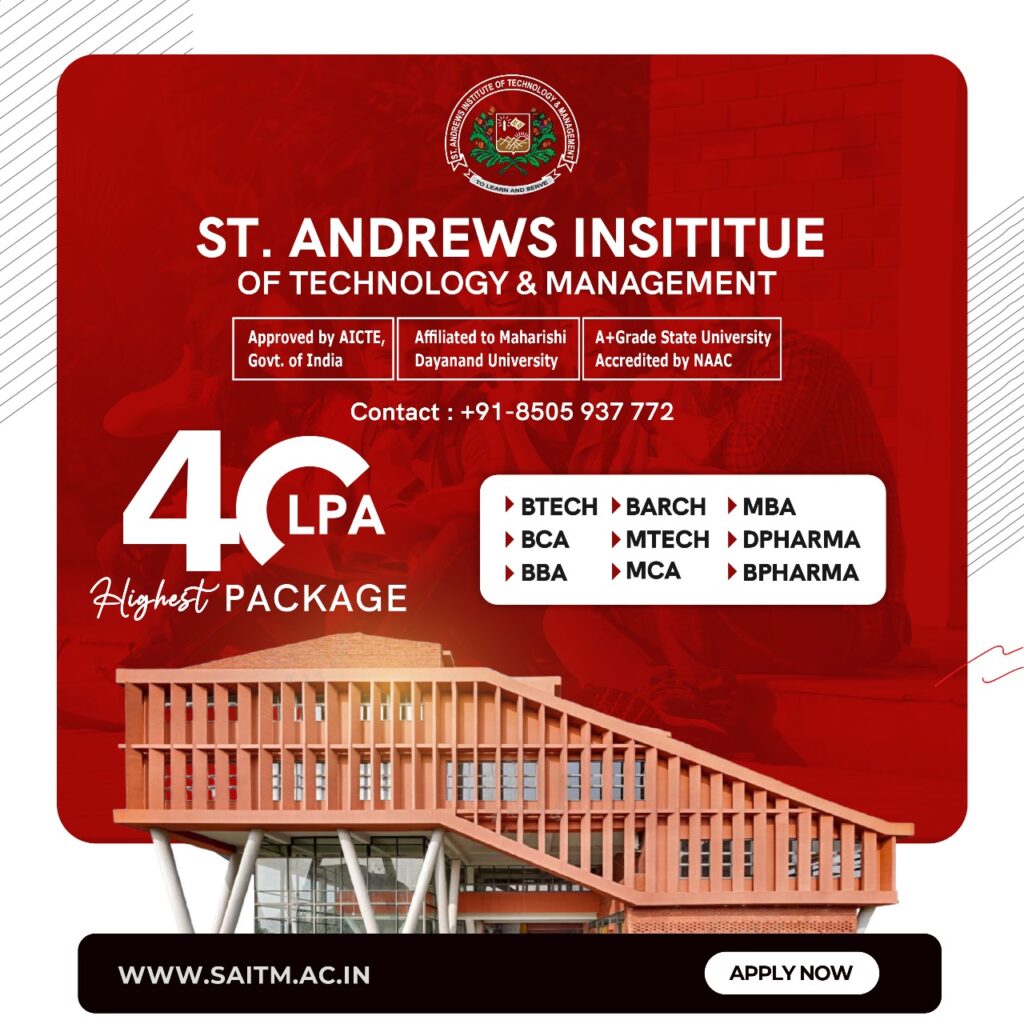
In the computer engineering syllabus, electives enable students to specialize further within their chosen field or explore interdisciplinary subjects, including advanced topics across various domains.
The specific electives offered may vary between universities and colleges, but they typically include courses from related fields such as:
Advanced Topics in AI and ML
Deep learning, reinforcement learning, AI applications.
Blockchain Technology
Cryptocurrency, smart contracts, decentralized applications (DApps).
Quantum Computing
Quantum algorithms, quantum cryptography, quantum information theory.
Robotics and Automation
Robot kinematics, computer vision for robotics, control systems.
Bioinformatics
Computational biology, genomic data analysis, protein structure prediction.
Game Development
Game design principles, game engines, virtual reality games.
Digital Image Processing
Image enhancement, pattern recognition, medical imaging.
Entrepreneurship and Innovation
Startup management, venture capital, technology entrepreneurship.
Importance of Specializations and Electives In Computer Science Engineering

Career Alignment
Specializations enable CSE engineers to align their expertise with specific industry demands or career trajectories, enhancing their competitiveness in the job market.
Depth of Knowledge
Electives allow students to delve deeper into areas of personal interest or emerging technologies, gaining expertise beyond core curriculum.
Interdisciplinary Learning
Interdisciplinary learning enables software engineer to select electives from fields such as mathematics, biology, or business. This approach broadens their perspectives and fosters the development of cross-disciplinary skills essential for holistic problem-solving and innovation.
Flexibility
The availability of diverse electives enables customization of the curriculum based on evolving industry trends and technological advancements.
Resources and Exams For Computer Science Engineering

Recommended Books and Authors
For those preparing for the CSE syllabus, here are some recommended books and authors that can greatly aid your studies.
“Introduction to Algorithms” by Thomas H. C
“Computer Networks” by Andrew S. Tanenbaum and David J. Wetherall
“Operating System Concepts” by Abraham Silberschatz, Peter B. Galvin, and Greg Gagne
“Database System Concepts” by Abraham Silberschatz, Henry F. Korth, and S. Sudarshan
“Artificial Intelligence: A Modern Approach” by Stuart Russell and Peter Norvig
“Software Engineering: A Practitioner’s Approach” by Roger S. Pressman
“Computer Organization and Design: The Hardware/Software Interface” by David A. Patterson and John L. Hennessy
“Introduction to the Theory of Computation” by Michael Sipser
“Pattern Recognition and Machine Learning” by Christopher M. Bishop
“Computer Graphics: Principles and Practice” by John F. Hughes, Andries van Dam, Morgan McGuire, David F. Sklar, James D. Foley, Steven K. Feiner, and Kurt Akeley
Entrance Exams for Computer Science Engineering in India
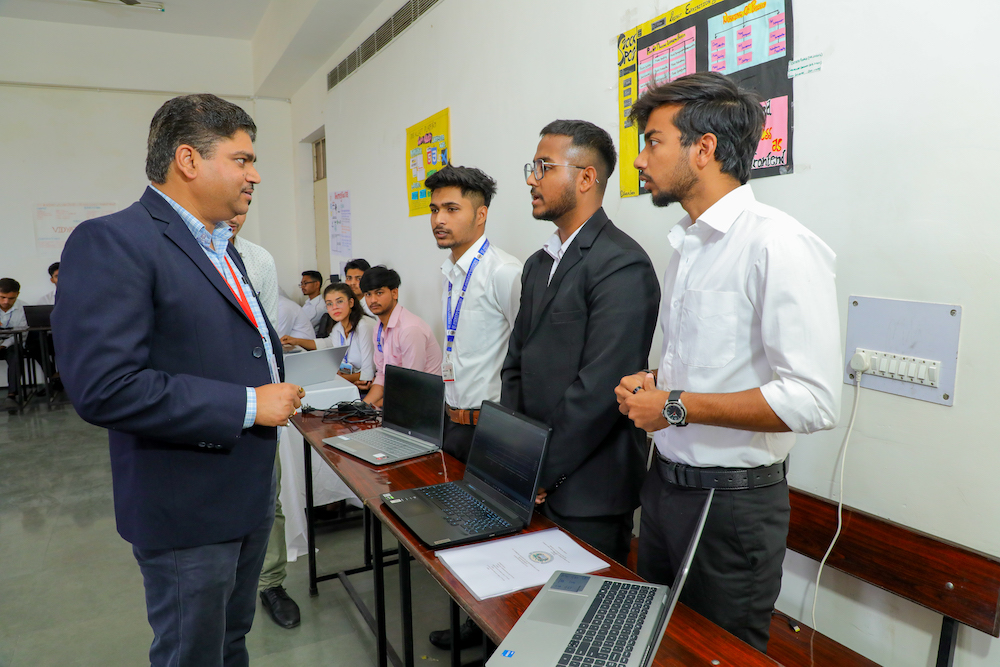
Entrance exams for Computer Science Engineering (CSE) are crucial for gaining admission into prestigious engineering colleges in India. Here’s a detailed explanation of the most prominent entrance exams:
Joint Entrance Examination (JEE) Main
Conducting Body
National Testing Agency (NTA)
Purpose
Admission to NITs, IIITs, and other centrally funded technical institutions, as well as a qualifying exam for JEE Advanced.
Eligibility
Educational Qualification
Passed 10+2 with Physics, Mathematics, and Chemistry/Biology/Biotechnology/Technical Vocational subject.
Age Limit
No age limit.
Exam Pattern
Mode
Computer-based
Subjects
Physics, Chemistry, Mathematics
Type of Questions
Multiple Choice Questions (MCQs) and Numerical Value Questions
Duration
3 hours
Total Marks
300
Joint Entrance Examination (JEE) Advanced
Conducting Body
One of the IITs (on a rotational basis)
Purpose
Admission to the Indian Institutes of Technology (IITs).
Eligibility
Qualification
Top candidates from JEE Main.
Educational Qualification
Passed 10+2.
Age Limit
Must be born on or after October 1, 1999 (5 years relaxation for SC/ST/PwD).
Exam Pattern
Mode
Computer-based
Subjects
Physics, Chemistry, Mathematics
Type of Questions
MCQs, Numerical Value Questions, and Match the Following
Duration
3 hours per paper (2 papers)
Total Marks
Varies each year
Karnataka Common Entrance Test (KCET)
Conducting Body
Karnataka Examinations Authority (KEA)
Purpose
Admission to engineering colleges in Karnataka.
Eligibility
Educational Qualification
Passed 10+2 with Physics, Mathematics, and Chemistry/Biology/Biotechnology/Electronics/Computer with at least 45% aggregate (40% for reserved categories).
Age Limit
No specific age limit.
Exam Pattern
Mode
Offline (OMR-based)
Subjects
Physics, Chemistry, Mathematics/Biology
Type of Questions
MCQs
Duration
1 hour 20 minutes per subject
Total Marks
180
Maharashtra Common Entrance Test (MHT-CET)
Conducting Body
State Common Entrance Test Cell, Maharashtra
Purpose
Admission to engineering colleges in Maharashtra.
Eligibility
Educational Qualification
Passed 10+2 with Physics, Mathematics, and Chemistry/Biology/Biotechnology/Technical Vocational subject with at least 50% aggregate (45% for reserved categories).
Age Limit
No specific age limit.
Exam Pattern
Mode
Computer-based
Subjects
Physics, Chemistry, Mathematics/Biology
Type of Questions
MCQs
Duration
3 hours (90 minutes for PCM and 90 minutes for PCB)
Total Marks
200
Top Colleges for Computer Science Engineering In India
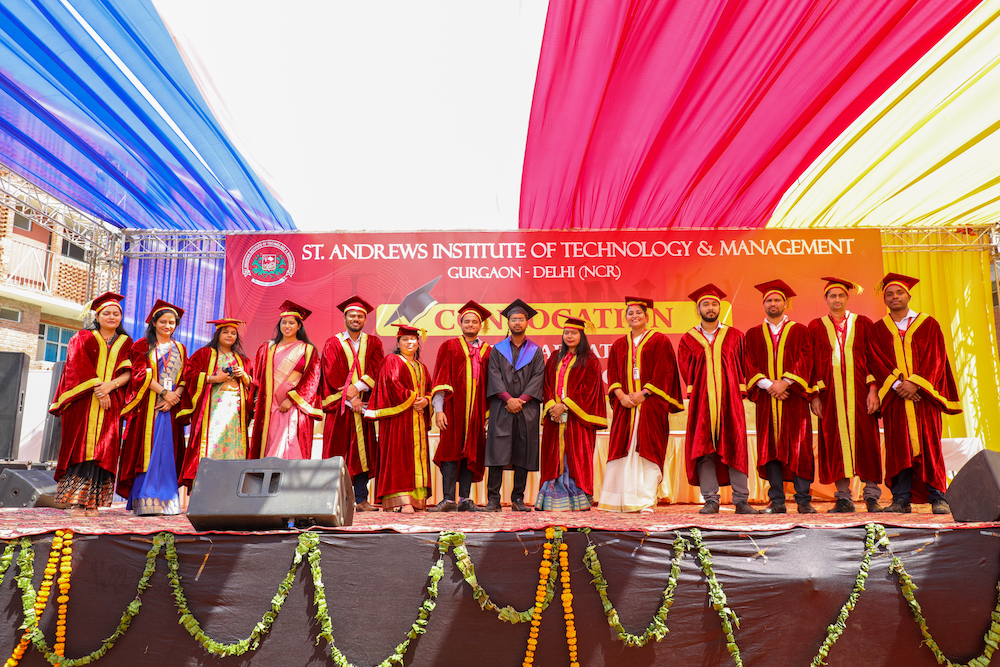
In India, several colleges are renowned for their Computer Science Engineering programs, offering a combination of academic excellence, infrastructure, faculty expertise, and placement opportunities. Here are some of the top colleges known for Computer Science Engineering (CSE):
Indian Institutes of Technology (IITs)
Overview
IITs are renowned as premier engineering institutes in India, celebrated for their rigorous academics and research-focused approach in computer engineering.
Specialization
Each IIT offers a robust CSE program with specializations in areas like AI, ml, cybersecurity, etc.
Admission
Through the highly competitive JEE Advanced exam.
National Institutes of Technology (NITs)
Overview
NITs are autonomous public technical universities known for their quality education and infrastructure.
CSE Programs
NITs offer comprehensive CSE programs with strong industry collaborations and research opportunities.
Admission
Through JEE Main followed by JoSAA counseling.
St. Andrews Institute of Technology and Management (SAITM), Gurgaon
Overview
SAITM, Gurgaon, is a private institute recognized for its high-quality education and modern infrastructure, particularly in the field of computer engineering.
CSE Department
Offers comprehensive programs in CSE with modern labs and industry tie-ups.
Admission
Direct Admission on the Basis of personal Interview.
Birla Institute of Technology and Science (BITS), Pilani
Overview
BITS Pilani is a renowned private institute known for its engineering and technology programs.
CSE Program
Offers a well-rounded CSE curriculum with emphasis on practical learning and research.
Admission
Through BITSAT (BITS Admission Test).
Delhi Technological University (DTU)
Overview
Formerly known as Delhi College of Engineering, DTU is a distinguished government engineering university in Delhi, particularly noted for its excellence in computer engineering.
CSE Department
Offers specialized programs in CSE with strong industry partnerships and research facilities.
Admission
Through JEE Main scores.
International Institute of Information Technology (IIITs)
Overview
IIITs are specialized autonomous institutes focusing on information technology and related fields.
CSE Programs
IIITs like IIIT Hyderabad, IIIT Delhi, etc., offer specialized programs in CSE with a focus on emerging technologies.
Admission
Through JEE Main and separate entrance exams conducted by individual IIITs.
Future Scope of Computer Science Engineer
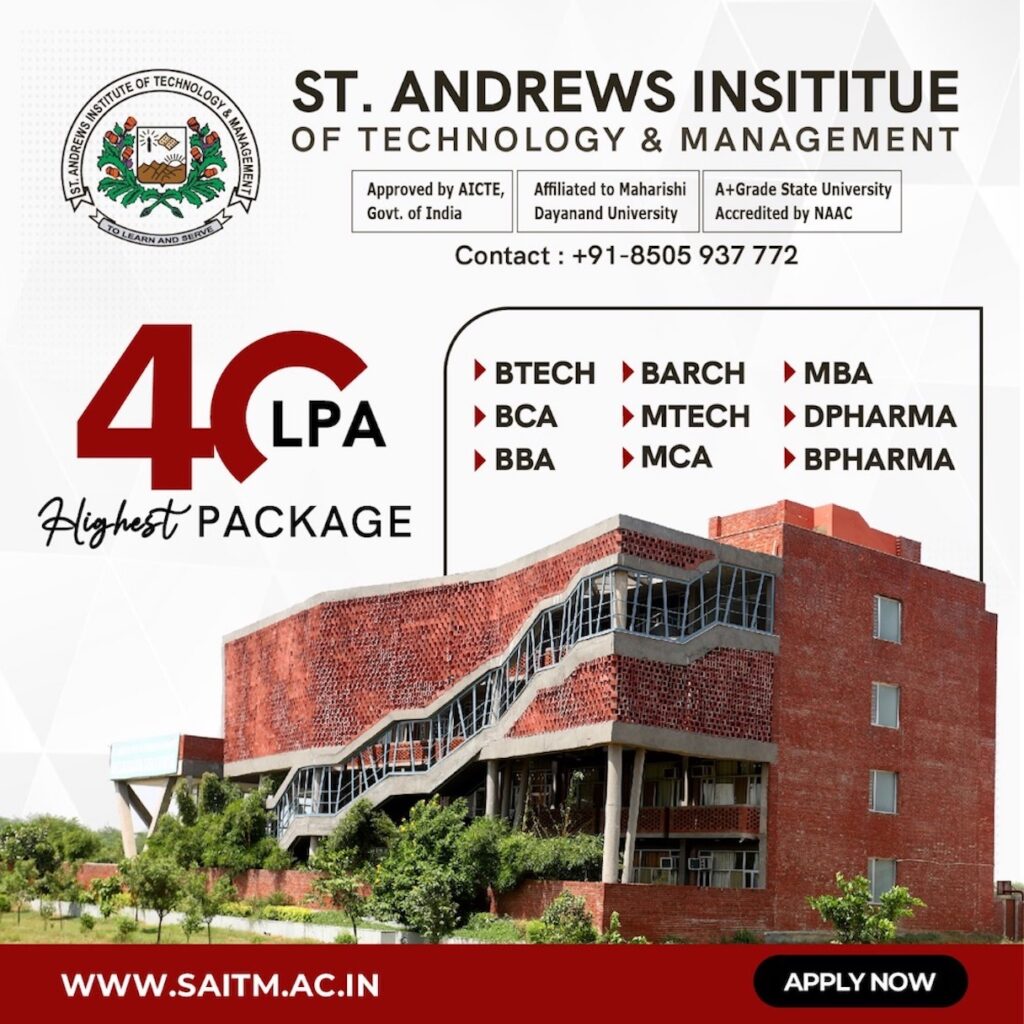
The future scope of Computer Science Engineering (CSE) is exceptionally promising, offering numerous career opportunities driven by rapid advancements in technology across various industries.
Here’s a detailed exploration of its future prospects:
Emerging Technologies
AI and ML
AI and ML are transforming industries with applications in automation, predictive analytics, natural language processing, and autonomous systems.
Career opportunities: AI/ML engineers, data scientists, AI researchers.
Big Data and Data Science
In computer engineering, Big Data technologies empower organizations to manage and analyze massive datasets efficiently, facilitating informed insights and strategic decision-making.
Career opportunities: Data analysts, data engineers, business intelligence analysts.
Internet of Things (IoT)
IoT connects devices and systems, enabling smart homes, cities, and industries.
Career opportunities: IoT architects, IoT developers, embedded technology engineers.
Cybersecurity
With increasing cyber threats, cybersecurity experts are crucial for safeguarding networks, systems, and data.
Career opportunities: Cybersecurity analysts, ethical hackers, security architects.
Cloud Computing
Cloud technologies provide scalable computing resources and services, driving digital transformation.
Career opportunities: Cloud architects, cloud engineers, DevOps specialists.
Industry Applications
Finance and Banking
AI for fraud detection, blockchain for secure transactions.
Healthcare
AI in diagnostics, telemedicine, medical imaging analysis.
Automotive
Autonomous vehicles, connected car technologies.
Entertainment
VR/AR for immersive experiences, content streaming platforms.
Research and Innovation
Quantum Computing
Potential to solve complex problems exponentially faster.
Biocomputing
Using biological systems for computing applications.
Edge Computing
Processing data closer to the source for faster response times.
Global Impact
Digital Transformation
Industries adopting technology for efficiency and innovation.
Sustainability
Using technology to address environmental challenges.
Global Connectivity
Advancements in communication technologies and global collaborations.
Career and Entrepreneurship
Entrepreneurship
Opportunities to innovate and start tech-driven ventures.
Remote Work
Increased flexibility and global job opportunities.
Continuous Learning
Lifelong learning essential due to rapid technological advancements.
FAQs
What is Computer Science Engineering (CSE)?
Computer Science Engineering is a discipline that integrates computer science principles with engineering concepts to design, develop, and manage software, hardware, and computer systems.
What are the core subjects typically covered in CSE?
Core subjects in BTech Computer Science include Mathematics, Programming, Data Structures, Algorithms, Computer Organization, Operating Systems, Databases, Networking, and Software Engineering, along with other fundamental areas. These subjects are part of the Computer Science Engineering Syllabus Semester Wise.
How long is the duration of a CSE program?
A typical CSE program in India spans over four years (eight semesters), leading to a Bachelor of Technology (B.Tech) or Bachelor of Engineering (B.E.) degree.
What are the key subjects in the early semesters of CSE?
Early semesters (1-2) focus on foundational subjects like Mathematics, Physics, Programming, Engineering Graphics, and basics of Electrical Sciences and Mechanics.
When do students start learning about computer-specific subjects like Data Structures and Algorithms?
Computer-specific subjects such as Data Structures, Algorithms, and Digital Logic Design are typically introduced from Semester 3 onwards, building on foundational programming skills.
How does the curriculum progress towards specialized topics like Artificial Intelligence and Machine Learning?
In computer engineering, specialized topics such as Artificial Intelligence, Machine Learning, and others are typically explored through elective subjects in the later semesters (5-8), enabling students to tailor their education according to their interests and career goals.
Are practical labs and projects a significant part of the CSE curriculum?
Yes, practical labs are conducted alongside theoretical subjects to provide hands-on experience in programming, hardware, networking, and software development. Project work in the final year involves implementing a substantial project showcasing application of learned concepts.
Can students undertake internships or industrial training as part of their curriculum?
Yes, many CSE programs include internships or industrial training either during summers or as a part of the curriculum in the later semesters to gain real-world experience and industry exposure.
How flexible is the CSE curriculum in terms of electives and specialization?
Computer engineering programs provide a variety of elective subjects in emerging fields such as Cybersecurity, Cloud Computing, Data Science, IoT, and more. This flexibility allows students to customize their education to align with their career aspirations and interests.
What opportunities are available for research and advanced study in CSE?
Opportunities for research and advanced study are often available through elective research projects, seminars, and participation in conferences, enabling students to delve deeper into specific areas of interest.
How does the CSE curriculum prepare students for careers in the industry?
The CSE curriculum is designed to equip students with technical skills, problem-solving abilities, teamwork, and technical communication skills sought after by employers in software development, IT consulting, research, and other technology-driven sectors.
What are the prospects for higher education or specialization after completing a CSE degree?
After completing a CSE degree, students can pursue higher studies such as Master’s programs (M.Tech, M.S.) or specialized courses in areas like Computer Science, Data Science, AI/ML, etc., both in India and abroad.
What is the syllabus of computer science engineering?
The Computer Science Engineering (CSE) syllabus encompasses fundamental subjects like Mathematics, Physics, and Computer Programming, progressing to specialized areas such as Data Structures, Algorithms, Operating Systems, and Database Management.
In computer engineering, the curriculum encompasses advanced subjects such as Artificial Intelligence, Machine Learning, and Cybersecurity, complemented by hands-on labs and project work. Students delve into digital logic design, computer organization, and software engineering principles, equipping them for careers in software development, systems analysis, and IT consultancy.
The curriculum also emphasizes professional ethics, communication skills, and industry internships, ensuring graduates are equipped with comprehensive knowledge and skills for careers in technology-driven industries.
What is the syllabus of CSE 1st semester?
In the first semester of computer engineering, students typically delve into Mathematics I, covering calculus and algebraic concepts. They also study Physics, focusing on mechanics, Engineering Graphics for foundational drawing skills, and Computer Programming, where they learn fundamental programming principles and problem-solving techniques using languages like C. This structure is a part of the Computer Science Engineering Syllabus Semester Wise.
This foundational semester lays the groundwork for subsequent learning in digital logic design, data structures, and further exploration into the diverse domains of computer science and engineering.
Is CSE engineering tough?
CSE can be challenging due to its rigorous curriculum in mathematics, programming, and complex theoretical concepts like algorithms and data structures. The field demands analytical thinking, problem-solving skills, and continuous learning of new technologies.
Nevertheless, with dedication, practice, and a genuine passion for technology, students can effectively navigate these challenges. Computer engineering course offers vast opportunities for growth and innovation, making it rewarding for those enthusiastic about driving the future through advancements in software, hardware, and computing systems.
Is CSE maths tough?
Mathematics in a computer engineering course is often perceived as challenging, as it delves into subjects such as calculus, linear algebra, discrete mathematics, and probability theory. These disciplines, found in the Computer Science Engineering Syllabus Semester Wise, are essential for understanding algorithms, data analysis, and computational theories pivotal in computer engineering and science.
Although demanding, mastering mathematical concepts in a computer engineering course is essential for problem-solving and developing efficient algorithms and software solutions. With commitment, consistent practice, and guidance from educators, students can surmount these challenges and excel in utilizing mathematical principles to address real-world engineering issues in computer science and engineering.

